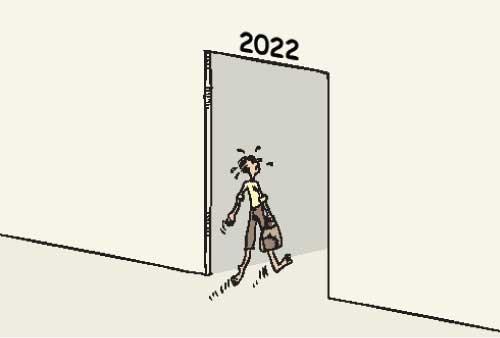03 Jan 2022 - {{hitsCtrl.values.hits}}
While we wish our readers a very happy New Year, for most of us, 2022 is going to be a very difficult one. Although our land is bountiful, today our people are facing difficulty in keeping the wolf from the door.
our land is bountiful, today our people are facing difficulty in keeping the wolf from the door.
In addition, the country is facing galloping inflation,- inflation having jumped 3 percentage points between November and December 2021. Inter and intra-government squabbling is on the rise. Cabinet ministers have appealed to the courts of the land to halt the implementation of Cabinet decisions and the president of the country is suggesting the dissidents should resign.
The cost of living has spiraled out of control, with the cost of having two basic meals a day per family of four costing between Rs. 25,000/- to Rs. 30,000/- a month.
At the same time, salaries of most workers have remained stagnant or have been cut - in some instances by 50% a month. The majority of residents in our capital city still live in slums and/or inadequate housing. These families are dependent on daily wages and constitute nearly 55% of the city’s population. Many of these families lost their employment to the pandemic and many of them still do not find jobs.
Those employed in the private sector had their wages halved by employers who claimed losses due to the Covid-19 pandemic – this, despite government providing loans so that employees’ salaries would not be reduced. These families too have now joined the ranks of the poor receiving wages of around Rs. 25,000/- a month if not less! The growing number of beggars including women with infants in arms at central bus halts, railway stations and at traffic lights bears out the veracity of this truth.
A silver lining, is that this country has been through similar situations on previous occasions and somehow managed to get back on to its feet. What is sad however that is, our leaders who do not seem to be learning from past experience. At a particular time during late premier Sirimavo Bandaranaike’s tenure - in 1974 - the country had only two weeks’ supply of rice in stock.
Thanks to an emergency shipment of 40,000 tons of rice from China, a food crisis was averted. The then US President on the other hand to whom the premier wrote a personal letter literally begging for a renewal of the PL 480 facility which the US had withdrawn, expressed sympathy but did not extend the facility. Premier Bandaranaike at that time called to the nation was ‘produce or perish’.
At that time too, the country faced a problem of meeting external debt re-payments amounting to around US$2 billion and therefore found it difficult to raise international funding to extricate itself from the morass of debt. Today - 27 years later - our country is once again in a similar situation. According to ‘Fitchratings.com’ government faces foreign-currency debt service payments, including principal and interest, of US$ 6.9 billion in 2022, equivalent to nearly 430% of official gross international reserves as of November 2021. The Governor of the Central Bank, quoted in state media said the country’s foreign reserves stood at US$1.6 billion.
The governor stressed one of the reasons for the shortfall in reserves was due to a drop in tourism earnings amounting to around US$ 4.5 billion caused by the pandemic which had resulted in a dollar crisis. But he failed to mention that migrant workers provided the largest inflow of foreign exchange into the country.
The question that arises is what practical steps government has taken to revive the tourism trade, entice foreign travellers to visit this country and reassure migrant workers that they will be able to use their hard-earned foreign currency in a manner they deem best once it is sent back to this country.
The hospitality sector has in fact been hard-hit by government rules and regulations regarding foreign currency, which in fact hinder their ability to attract high-end travellers. Again, there is little evidence of government reassuring migrant workers of the safety of their earnings.
The new regulations governing the use of foreign currency in private accounts does not breed confidence. It may well result in migrant workers sending only a trickle of their earnings home and keeping their earnings in banks abroad. The promise of a 10-rupee extra per US$ only exposes the falling value of the rupee vis-a-vis the dollar. The New Year’s Eve announcement of an increase in the cost of a 1 kg pouch of milk being raised by a stunning Rs.150/- per kg is emblematic of a not-so-happy year ahead.
28 Nov 2024 12 minute ago
28 Nov 2024 1 hours ago
28 Nov 2024 3 hours ago
28 Nov 2024 4 hours ago
28 Nov 2024 4 hours ago